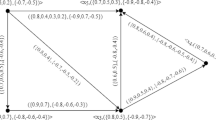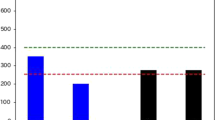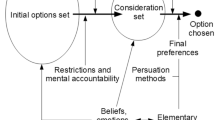Abstract
Suppose a strict preference relation fails to possess maximal elements, so that a choice is not clearly defined. I propose to delete particular instances of strict preferences until the resulting relation satisfies one of a number of known regularity properties (transitivity, acyclicity, or negative transitivity), and to unify the choices generated by different orders of deletion. Removal of strict preferences until the subrelation is transitive yields a new solution with close connections to the “uncovered set” from the political science literature and the literature on tournaments. Weakening transitivity to acyclicity yields a new solution nested between the strong and weak top cycle sets. When the original preference relation admits no indifferences, this solution coincides with the familiar top cycle set. The set of alternatives generated by the restriction of negative transitivity is equivalent to the weak top cycle set.
Similar content being viewed by others
References
Austen-Smith D, Banks J (1999) Positive political theory I: collective preference. University of Michigan Press, Ann Arbor
Banks J (1985) Sophisticated voting outcomes and agenda control. Soc Choice Welfare 1:295–306
Banks J (1995) Acyclic social choice from finite sets. Soc Choice Welfare 12:293–310
Banks J, Duggan J, Le Breton M (2002) Bounds for mixed strategy equilibria in the spatial model of elections. J Econ Theory 103:88–105
Banks J, Duggan J, Le Breton M (2006) Social choice and electoral competition in the general spatial model. J Econ Theory 126:194–234
Duggan J (1999) A General extension theorem for binary relations. J Econ Theory 86:1–16
Duggan J (2006) Uncovered sets. Mimeo
Duggan J, Le Breton M (1997) Dominance-based solutions for strategic form games. Mimeo
Duggan J, Le Breton M (1999) Mixed refinements of Shapley’s saddles and weak tournaments. CORE discussion paper, no. 9921
Duggan J, Le Breton M (2001) Mixed refinements of Shapley’s saddles and weak tournaments. Soc Choice Welfare 18:65–78
Fishburn P (1977) Condorcet social choice functions. SIAM J Appl Math 33:469–489
Mas-Colell A, Sonnenschein H (1972) General possibility theorems for group decisions. Rev Econ Stud 39:185–192
McKelvey R (1986) Covering, dominance, and institution-free properties of Social Choice. Am J Polit Sci 30:283–314
Miller N (1980) A new solution set for tournaments and majority voting: further graph-theoretical approaches to the theory of voting. Am J Polit Sci 24:68–96
Moulin H (1986) Choosing from a Tournament. Soc Choice Welfare 3: 271–291
Schwartz T (1986) The logic of collective action. Columbia University Press, New York
Schwartz T (2001) From arrow to cycles, instability, and chaos by untying alternatives. Soc Choice Welfare 18:1–22
Sen A (1970) The impossibility of a Paretian liberal. J Polit Econ 78:152–157
Walker M (1977) On the existence of maximal elements. J Econ Theory 16:470–474
Author information
Authors and Affiliations
Corresponding author
Rights and permissions
About this article
Cite this article
Duggan, J. A systematic approach to the construction of non-empty choice sets. Soc Choice Welfare 28, 491–506 (2007). https://doi.org/10.1007/s00355-006-0176-1
Received:
Accepted:
Published:
Issue Date:
DOI: https://doi.org/10.1007/s00355-006-0176-1




